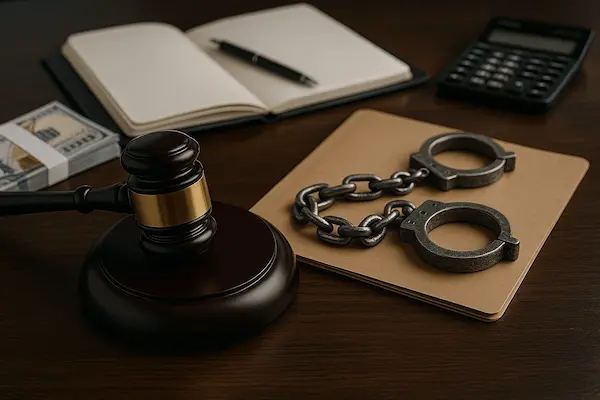
NO PUNISHMENT WITHOUT CULPABILITY
This foundational principle asserts that criminal penalties cannot be based solely on the result of an action, but must also consider whether the offender could have acted differently. If there is no intent or negligence, there is no culpability, and therefore, no punishment is warranted.
Within criminal theory, this principle also aligns with the humanity of penalties doctrine, which prohibits punishment beyond an individual’s personal responsibility.
Practical example:
If someone has an unexpected epileptic seizure while driving and hits a pedestrian, they cannot be held criminally liable because the act was neither intentional nor negligent—it is not reproachable.
DIFFERENCE BETWEEN INTENT (DOLO) AND NEGLIGENCE (CULPA)
Intent (Dolus)
Intent involves the conscious and voluntary decision to commit a criminal offense. Legal doctrine distinguishes between:
- Direct intent: The offender deliberately aims to produce the result (e.g., shooting with the intention to kill).
- Eventual intent: The offender does not desire the result but consciously accepts the risk (e.g., driving drunk at high speed through a school zone).
Example:
A person drives intoxicated through a pedestrian zone, aware of the likely danger but proceeds anyway.
Negligence (Culpa)
Negligence refers to the violation of the duty of care that any reasonable person would observe under the same circumstances. It may include:
- Negligence: Carelessness or inattention.
- Recklessness: Acting with disregard for obvious risks.
- Lack of expertise: Inadequate technical knowledge in a professional setting.
Example:
A driver causes a crash while distracted by their phone. The accident was unintentional, but due to negligence.
In the criminal system, negligent acts are only punishable if explicitly stated by law. Otherwise, only intentional acts (dolus) are subject to penalties.
OMISSIVE CONDUCT: WHEN FAILURE TO ACT IS A CRIME
In some circumstances, the law equates failure to act with causing harm, but only when the individual has a special legal duty to act as a guarantor. This doctrine is based on the idea that the protection of certain legal interests depends on actions from individuals legally obligated—by law, contract, or voluntary assumption of duty.
Example:
A father watches his young child fall into a pool and does nothing to help, despite being present and having a legal duty to protect. This omission is treated as equivalent to causing the child’s death.
CRIMINAL LIABILITY OF CORPORATE REPRESENTATIVES AND EXECUTIVES
Legal doctrine recognizes that culpability can extend to administrators, executives, or representatives of companies and organizations. Even when acting on behalf of a legal entity, these individuals are personally liable if the conditions for criminal liability are met.
This reflects the principle that criminal liability is personal and non-transferable—no one can hide behind a legal entity to avoid accountability.
Example:
A factory manager orders the violation of safety protocols to cut costs, resulting in a serious workplace accident. Though acting on behalf of the company, the manager bears direct personal responsibility.
MISTAKE OF FACT AND LAW IN CRIMINAL LAW
Mistakes are significant in criminal law because they can exclude or mitigate culpability by affecting the offender’s understanding of the act. Legal doctrine distinguishes between:
Mistake of Fact
This occurs when the offender misperceives a critical aspect of reality regarding the criminal act.
- Invincible mistake (unavoidable): Excludes criminal responsibility.
- Vincible mistake (avoidable): May lead to negligent liability if recognized by law.
Example:
Someone mistakenly takes an identical backpack, believing it to be their own. The error negates intent; if unavoidable, it excludes responsibility.
Mistake of Law
This refers to unawareness of the illegality of one’s conduct.
- Invincible mistake: Exempts the offender from punishment.
- Vincible mistake: May reduce the penalty under applicable legal provisions.
Example:
A foreign national hunts a protected animal without knowing it’s illegal in Bolivia. If the error was unavoidable, there is no liability; if avoidable, the penalty is mitigated.
PENALTY REDUCTION IN CASES OF MISTAKE
When the law allows for special mitigation, penalties may be significantly reduced in accordance with the principles of proportionality and human dignity. These reductions are regulated and aim to align punishment with the actual degree of culpability.
Example:
In cases of avoidable mistake of law, a crime punishable by 30 years in prison may see the sentence reduced to 15 years.
In conclusion, culpability in Bolivian criminal law is not limited to the outcome of an act, but hinges on a reproach-based assessment of the offender’s behavior. Sanctions apply only when conduct is attributable to intent or negligence. The law also provides for criminal liability by omission under special duties, personal liability of legal representatives, and the relevance of factual or legal errors. Finally, special rules of mitigation ensure penalties are proportionate to actual culpability.
Culpability thus serves as a fundamental safeguard against arbitrary punishment by the State, ensuring proportionality and justice in each case.
If you are facing a criminal matter involving intent, negligence, omission, or legal error, our law firm offers expert legal counsel and representation. Contact us today for personalized assistance.
Frequently Asked Questions (FAQs)
What does “no punishment without culpability” mean?
It means that no one can be punished unless they acted with intent or, in some cases, with legally recognized negligence.
Is negligence always punishable?
No. Negligence is only punishable when the law explicitly establishes it as such.
Can failure to act be punished as a crime?
Yes, but only if the person had a legal duty to prevent the outcome.
What happens if I act under a mistake?
If the mistake is unavoidable, it may exclude liability. If avoidable, it may result in negligent liability or a reduced penalty.
Can a company representative be held criminally liable?
Yes, if the personal conditions for criminal liability are met within the company, the representative is directly responsible.
The content of this article does not reflect the technical opinion of Rigoberto Paredes & Associates and should not be considered a substitute for legal advice. The information presented herein corresponds to the date of publication and may be outdated at the time of reading. Rigoberto Paredes & Associates assumes no responsibility for keeping the information in this article up to date, as legal regulations may change over time.



